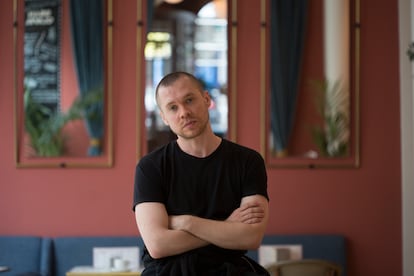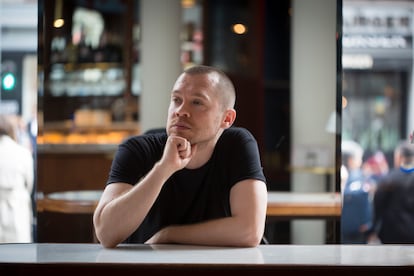Gary Stevenson: ‘Economists have been all wrong about almost everything for 15 years now’
After growing up in poverty he became a millionaire as a highly successful trader at Citibank, then quit at 26, feeling exhausted. These days Stevenson is an activist trying to stop the global economic system from collapsing due to rising inequality


At age 12, Gary Stevenson sold candy. At 16, he was kicked out of high school for selling cannabis. At 23, Citigroup gave him a bonus of €47,000 for lending money, selling loans. It was double the annual salary of his father, a postal worker. By the age of 26, he was a millionaire, but he had holes in his shoes and was unable to buy a sofa for his empty house. Mentally and physically exhausted, he decided to quit, even though he says that they threatened him to try to make him stay. Now 36, the British economist has become an activist who dedicates his time to warning about the impending collapse of the economy due to inequality. He tells his story in The Trading Game: A Confession.
Question. Why did you write this book? Is it a warning or a confession?
Answer. Both. It is part of a political project. The economy is getting worse and worse without most economists realizing it. I try to raise awareness about this by writing in newspapers, with my own YouTube channel... but to connect with people you have to tell them a story and I wrote about my own experience. I think it is much more powerful politically than any purely economics book I could write.
Q. You say that shortly before entering Citigroup an employee committed suicide by jumping from the 20th floor. Did you think about that man while you worked there?
A. The truth is, not really. Bankers have a long history of jumping from skyscrapers. This guy could have jumped from the outside, but he jumped in the internal atrium, because he wanted everyone to see, for traders to have a peek before going back to their desks. And my reaction was “so it goes.” It was a powerful metaphor for the way this world works, the level of obsession. It is an example of dehumanization.
Q. What should a trader in the City be like? What do you need to survive?
A. There is a book, Catch-22, that tells what lots of different people do to survive the war: some become obsessed with money, others with escaping, and others with enjoying everything as much as they can. Different traders do different things, some go out drinking, take drugs, go to Vegas... Cocaine addiction is a massive problem, gambling is a massive problem. Others, like me, were obsessed with being the best trader. The question to me is how humans survive in traumatic spaces. And a lot of people do not survive in many ways because they become dehumanized, they become aggressive people who hate others.
Q. You say in the book: “Many rich people expect the poor to be dumb.” Did you use it as an advantage?
R. It definitely was. They assumed I was an idiot. It happened at the London School of Economics, at Oxford... But, on the trading floor, I realized that they thought: ‘If this guy got here with that accent, it must be because he must be very smart, because if not, how did he get here?’ There is an irony because at that time I had no idea what I was doing, but they thought I was going to be the best, and in the end I became the best.
Q. You once lost eight million pounds before making much more. In your book you write that “the best trading is made with the nose. It smells like stupidity.” What does that mean?
A. In the world of trading, you do not make big money just for being right, but when you are right and everybody else is wrong. And that’s the kind of trading I specialized in, in being able to smell the bullshit when everybody believes it. My big trade was in 2011 because everybody thought things were going to get better and everybody was wrong. With the nuclear crisis in Japan, everyone went crazy: no one really knew what it was about, but everyone pretended that they did. Economists have been all wrong about almost everything for 15 years now. Lots of very intelligent people, with the most expensive suits and haircuts and with elite degrees from elite universities, have got it all wrong for a long time now. That’s fascinating to me and I have made a lot of money thanks to that.
Q. You were betting on disaster. What would have happened if there hadn’t been people like you who were betting that the economy was going to crash?
A. The story of the last 15 years in economics has been one of incorrect optimism because there is an undiagnosed structural crisis of inequality. If you have cancer and are not diagnosed, if doctors treat the symptoms, but not the cause, you will get worse. That’s what’s happening in the economy. Nobody looks at the distribution, the inequality. People like me make no difference if we’re working as traders, even though we can get paid millions to work at a bank. Politicians are not paid to do the right thing, but to win elections. Nobody in the public sphere is paid to be right. There are no incentives in the public sector to get it right, to do the right thing.
Q. But if they don't do the right thing, they can lose the next election.
A. Yes, but David Cameron earned £10 million within one year after leaving. Tony Blair’s son is one of the richest men in the world. The current prime minister’s father-in-law is one of the richest men in the world. Politicians who lose elections end up really rich.
Q. When they transferred you to Japan you were devastated. Your girlfriend, who only joined you when she had her own job and income, was asking you to leave Citigroup, but at that time, you left the girl, not the job. Did you exchange money for happiness?
A. Right now I could be on a beach in the Philippines, I don’t have to be making this book or videos for YouTube. I come from a poor family, from a bad neighborhood, from a difficult childhood. I don’t do what I do for money, but because I don’t want the bad guys to win. Sometimes I wonder why nice kids from nice families aren’t doing the work I’m doing. I do it because I don’t want the world to go down the toilet. That money that I was fighting for then [a bonus he was owed] is what funds the work I do now.
Q. Who are “the bad guys”?
A. Many people who read the book will think they are the bankers. That is not all I want to say. I have a lot of empathy for my former colleagues, although they are multimillionaires and can take care of themselves. I am very confident that poverty will grow massively in the next 10 years because the system guarantees a flow of wealth away from the middle class, increasing inequality. That means that your grandchildren will live in desperate poverty. It would very nice to be able to say that the bad guys are guys like Elon Musk or George Soros, but that won’t get us anywhere. We get somewhere by stopping the economy from collapsing. I don’t want to have a big meeting on the Titanic to decide who the bad guys are, I want to steer the ship away from the iceberg. Being a banker helped lift my family out of poverty. The bad guys aren’t them, it’s the system.
Q. Caleb, your mentor, retired at age 29, but later returned. Have you been tempted to return?
A. I still sometimes have a recurring dream that I am still trading really well but I don’t get the bonus. I still check the markets every day. I don’t need the money, but I miss being known as the best. But I don’t think I’ll ever go back. I think what I do now is important.
Q. What relationship do you have with money now?
A. I don’t spend much. I live frugally. I don’t wake up and think about money, I think about how to win this fight. In my life I went very quickly from being judged for being poor to being judged for being rich.
Q. Your book says: “Rich people get the assets, poor people get the debt.” How do you see the future of the middle class?
A. It’s going to get smaller and smaller. The future? Look at Colombia, Mexico, Brazil... Europeans are somewhat naive about the economy. They think that what happens in those places cannot happen here, but countries with a lot of inequality end up like this. When you read Dickens you see the poverty of my own country 150 years ago. We are losing the standards of well-being that our forefathers fought for.
Q. You signed a letter with other British millionaires asking the prime minister to raise your taxes. But people who will never smell the amount of money that you handle oppose the rich paying more. What do you attribute it to?
A. There are several reasons. The right is building a narrative that is not correct, but is compelling: ‘You are poor because of the immigrants, who occupy your homes and your job,’ when it is because of inequality, because the rich are the children of the rich, who are the ones who take the money, not the immigrants. And the left does not have a clear message on the economy, it is not able to explain that things can be changed. There are many rich people who own many newspapers capable of convincing people that the problem is immigrants. We are going towards a more xenophobic Europe and we could end up where we were 100 years ago.
Q. You talk about the economy of inheritance, but education also works against that, right? You are living proof: from a poor neighborhood to the London School of Economics and from there to Citigroup.
A. Yes, I come from a poor neighborhood and I got a good job and a lot of money. But almost everyone I know is exactly as rich as their father and I know people who can’t afford a house on their salary alone. It is not a meritocracy. Wealth is hereditary.

Sign up for our weekly newsletter to get more English-language news coverage from EL PAÍS USA Edition.
Tu suscripción se está usando en otro dispositivo
¿Quieres añadir otro usuario a tu suscripción?
Si continúas leyendo en este dispositivo, no se podrá leer en el otro.
FlechaTu suscripción se está usando en otro dispositivo y solo puedes acceder a EL PAÍS desde un dispositivo a la vez.
Si quieres compartir tu cuenta, cambia tu suscripción a la modalidad Premium, así podrás añadir otro usuario. Cada uno accederá con su propia cuenta de email, lo que os permitirá personalizar vuestra experiencia en EL PAÍS.
¿Tienes una suscripción de empresa? Accede aquí para contratar más cuentas.
En el caso de no saber quién está usando tu cuenta, te recomendamos cambiar tu contraseña aquí.
Si decides continuar compartiendo tu cuenta, este mensaje se mostrará en tu dispositivo y en el de la otra persona que está usando tu cuenta de forma indefinida, afectando a tu experiencia de lectura. Puedes consultar aquí los términos y condiciones de la suscripción digital.








































